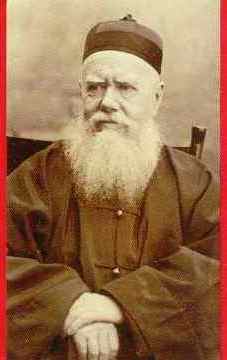
By Mark Ellis
James Hudson Taylor, the pioneering missionary who opened inland China to the Gospel, had a remarkable experience with God that brought newfound peace and unsurpassed joy to his ministry. And it happened in a most unexpected way.
On the outside, Taylor may have appeared as a pillar of strength. But inwardly, the pressures and demands of growing ministry responsibilities were taking their toll. He had trusted God for 24 fellow workers to open the interior of China. But as the new workers entered the field, threats multiplied.
“Those were days when scarcely a station in China was opened without danger to life itself. Riots were so usual that they seemed almost part of the proceedings,” wrote Taylor’s second son, Howard, in the classic book, “Hudson Taylor’s Spiritual Secret.” (Moody Publishers)
As his burdens increased, Hudson penned this in a letter to his mother, “At times I seem almost overwhelmed with the internal and external trials connected with our work.”
The inward struggle seemed to echo the Apostle Paul’s in Romans 7. “I cannot tell you how I am buffeted sometimes by temptation. I never knew how bad a heart I have,” Taylor wrote.
“Each day brought its register of sin and failure, of lack of power,” he wrote to his sister. “Must it be thus to the end – constant conflict, and too often defeat?”
“Instead of growing stronger, I seem to be getting weaker and to have less power against sin,” he confessed. “I hated myself, I hated my sin, yet gained no strength against it.”
The more he strove after holiness, the more it seemed to elude his grasp. As he considered the grace lavished on him by Jesus, Taylor’s guilt and helplessness increased. “Unbelief was I felt the damning sin of the world, yet I indulged in it. I prayed for faith, but it came not. What was I to do?”
But then, 15 years after he first set foot in China, God reached down and touched his heart in such a powerful way it changed the course of his future ministry. The transformative moment came as Taylor perused a letter from a fellow missionary, John McCarthy.
“When my agony of soul was at its height, a sentence in a letter from dear McCarthy was used to remove the scales from my eyes, and the Spirit of God revealed to me the truth of our oneness with Jesus as I had never known it before,” Taylor wrote later.
McCarthy’s letter revealed his own recent epiphany. “I do wish I could have a talk with you now about the way to holiness,” he wrote. “I now think that this striving, longing, hoping for better days to come is not the true way to holiness, happiness or usefulness.”
“Abiding, not striving nor struggling; looking off unto Him; trusting Him for present power;…resting in the love of an almighty Savior,” he continued, is the key.
“How then to have faith increased? Only by thinking of all that Jesus is and all He is for us: His life, His death, His work, He Himself revealed to us in the Word, to be the subject of our constant thoughts. Not a striving to have faith…but a looking off to the Faithful One seems all we need; a resting in the Loved One entirely, for time and for eternity.”
As Taylor read the letter and grasped the concept of abiding in a new, fresh way, joy welled up in his heart and began to overflow. “As I read, I saw it all!” he exclaimed. “I looked to Jesus and saw that He had said, ‘I will never leave thee.’ (and when I saw, oh, how joy flowed!)
“Ah, there is rest! I have striven in vain to rest in Him. I’ll strive no more. For has not He promised to abide with me – never to leave me, never to fail me?”
He recognized how vain and fruitless his previous exertions had been. “How great seemed my mistake in wishing to get the sap, the fullness out of Him! I saw not only that Jesus will never leave me, but that I am a member of His body, of His flesh, and of His bones.”
The difference in Taylor’s life as a result of this experience was evident to everyone around him. Missionary Charles Henry Judd records the remarkable change. “He was a joyous man now, a bright happy Christian. He had been a toiling, burdened one before, with latterly not much rest of soul.”
“It was resting in Jesus now, and letting Him do the work – which makes all the difference,” Judd observed. “Whenever he spoke in meetings after that, a new power seemed to flow from him, and in the practical things of life a new peace possessed him. Troubles did not worry him as before. He cast everything on God in a new way, and gave more time to prayer.”
In Martyn Lloyd-Jones’ book, “Joy Unspeakable,” he chronicled similar experiences among other Christian leaders, including George Whitefield, John Wesley, Dwight L. Moody, and R.A. Torrey.
“Read the story of Whitefield and you will see the agony through which he passed before this happened to him,” Lloyd-Jones noted. “John Wesley’s struggle went on for months, perhaps even longer. R.A. Torrey describes and teaches exactly the same thing.”
“All these men had to pray, had to plead. They did not ‘take it by faith,’ or ‘demand,’ it, or ‘claim’ it. Certainly not!…God in His own time answered them. The Lord baptized them with the Holy Spirit.”
Whether one terms it a revival of the heart, a second blessing, baptism of the Holy Spirit, or awakening, God did it all in His way and in His timing.
“Oh that the Christian church today were filled with such people!” Lloyd-Jones remarked. “Let us make certain that we become such people and then the revival for which we are longing will have already started.”




Comments are closed.